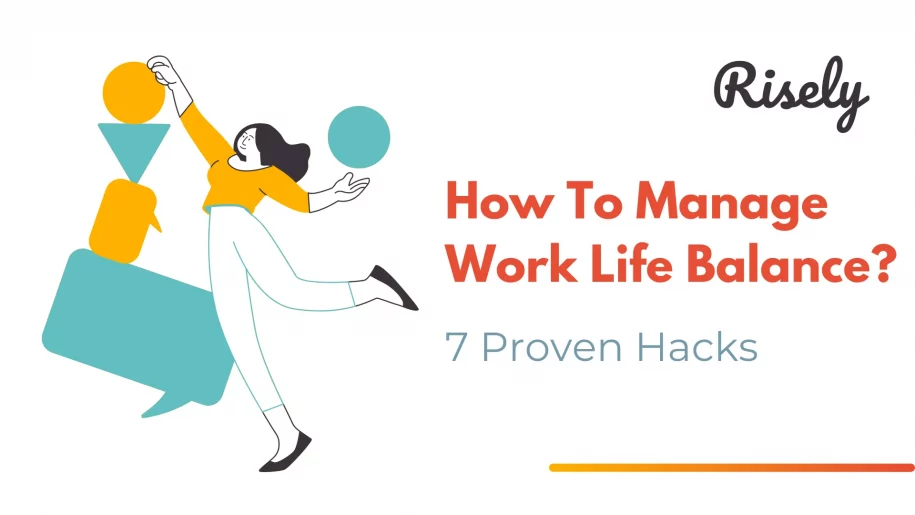How To Manage Work Life Balance? 7 Proven Hacks
Finding a balance between work and personal life is a challenge many face today’s fast-paced and demanding world. The constant pressure to excel professionally often neglects personal well-being and relationships. However, maintaining a healthy work-life balance is crucial for achieving long-term success and happiness. In this blog, we will explore the concept of work-life balance and its importance. We will discuss the signs of poor balance and strategies to improve it. We will also explore the benefits of incorporating flexibility into your schedule, embracing remote work opportunities, utilizing time management tools, and promoting a healthy lifestyle. Finally, we will explore the role of a supportive work environment in cultivating work-life balance.Let’s Understand Work-Life Balance
Work-life balance encompasses prioritizing and managing the demands of one’s professional and personal life. It involves finding a healthy equilibrium that allows you to excel in your careers while also caring for mental, emotional, and physical well-being. As per surveys, it features among the top considerations of 7 out of 10 individuals looking for new roles!Three Components of Your Work life balance
- Mental health is a crucial aspect of this equation. Juggling multiple responsibilities and dealing with work-related stress can take a toll on mental well-being. It is important to allocate sufficient time for self-care activities, such as relaxation, mindfulness, and hobbies, to maintain a positive mental state.
- Personal life plays a significant role in this balance. Building and nurturing personal relationships, spending quality time with loved ones, and engaging in activities that bring joy and fulfillment are essential for overall happiness and satisfaction.
- Physical health is another vital component of work-life balance. Regular physical activity, a balanced diet, and enough rest and sleep are all crucial for optimal physical well-being. Taking care of one’s physical health can boost energy levels, enhance productivity, and reduce the risk of physical ailments.
The Importance of Work-Life Balance for Managers
Work-life balance is important for both individual employees and managers. As leaders within an organization, you are responsible for setting an example and creating a supportive work environment. Poor work-life balance can lead to increased stress levels among managers, negatively impacting your decision-making abilities and overall performance. By prioritizing work-life balance, you can effectively manage stress levels and enhance your professional capabilities. Work-life balance also influences professional relationships within a team. When managers prioritize work-life balance, they foster a positive work culture that values the well-being of employees. This promotes better communication, collaboration, and teamwork, increasing employee satisfaction and productivity. Additionally, work-life balance allows you to allocate quality time to important aspects of your personal lives, such as family, hobbies, and self-care. This not only enhances personal happiness but also helps maintain healthy work-life integration.Signs of Poor Work-Life Balance
Recognizing the signs of poor work-life balance is the first step towards making positive changes. Some common signs include:- Long work hours indicate an imbalance between professional and personal life. Consistently working overtime or taking work home leads to exhaustion, burnout, and a decline in overall well-being.
- Mental health issues, such as anxiety, depression, and chronic stress, can be indicators of poor work-life balance. Neglecting personal well-being and continuously prioritizing work over personal life can take a toll on mental health.
- Feeling like there is never enough time for personal activities, hobbies, and relationships is another sign of poor work-life balance. If work consistently dominates most of your time and attention, it leads to a diminished quality of life and strained personal relationships.
Other Interesting Reads
How to Manage Work Life Balance? 7 Proven Hacks
Improving work-life balance requires a proactive approach and the implementation of effective strategies. By incorporating these strategies into daily life, individuals can achieve a healthier and more fulfilling work-life balance.Prioritizing Tasks and Delegating Responsibilities
Prioritizing tasks and delegating responsibilities are effective strategies for managing work-life balance. By efficiently managing workloads and utilizing the skills and strengths of team members, you can create a more balanced approach to work. Here are some tips for prioritizing tasks and delegating responsibilities:- Use a daily planner or task management tool to organize and prioritize tasks.
- Identify tasks that can be delegated to other team members based on their expertise and availability.
- Communicate with your team members to ensure a clear understanding of responsibilities and timelines.
- Regularly review and reassess priorities to maintain a balanced workload and avoid feeling overwhelmed.
- Setting goals that align with your personal values and priorities allows individuals to focus their time and energy on what truly matters to them.
Incorporating Flexibility into Your Schedule
Incorporating flexibility into your schedule is an effective way to improve your work-life balance. Flexible work arrangements provide individuals with the freedom and autonomy to manage their work and personal responsibilities more effectively. Flexible work hours allow you to align work schedules with your peak productivity hours and personal commitments. This flexibility promotes a better work-life balance and enables individuals to manage their time more efficiently. Taking breaks throughout the day to engage in personal tasks can help you recharge and maintain focus. These breaks can include activities such as exercise, hobbies, or spending time with loved ones. By incorporating personal tasks into the workday, you can achieve a better balance between work and personal life. Additionally, implementing flexible work arrangements, such as remote work options or compressed workweeks, can further enhance work-life balance. Remote work allows your team to work from anywhere, reducing commuting time and allowing for a better integration of personal and professional life.Utilizing Time Management Tools
Utilizing time management tools is an effective way to improve your work-life balance. These tools help individuals stay organized, prioritize tasks, and efficiently use their time. One of the first steps in managing work-life balance is recognizing how much time is spent on different activities. Time-tracking apps or daily planner tools can help individuals gain insight into how they are allocating their time and identify areas where adjustments can be made. Using a daily planner is an effective way to stay organized and keep track of tasks and commitments. By creating a clear schedule and prioritizing tasks, individuals can better manage their time and achieve a more balanced approach to work and personal life. Time management tools can help individuals avoid procrastination and focus on essential tasks. They provide reminders and alerts, assisting individuals to stay on track and meet deadlines. Here are a few ideas you can start with:- The top 5-time management tools for a manager to use
- Time Management Toolkit for managers (free download)
Promoting a Healthy Lifestyle
Promoting a healthy lifestyle is essential for achieving and maintaining work-life balance. A healthy lifestyle encompasses physical and mental well-being and is crucial to overall happiness and success. Prioritizing physical health through regular exercise, a balanced diet, and adequate rest can boost your energy levels, reduce stress, and enhance overall well-being. Engaging in activities that promote mental health, such as mindfulness, meditation, and hobbies, can also contribute to a more balanced and fulfilling life.Managing Expectations and Modeling Balance
A key aspect of leading by example is managing expectations and modeling a healthy work-life balance. As a manager or leader, you must set realistic expectations for your team and ensure they have sufficient time to balance their personal and professional responsibilities. This can involve setting clear deadlines, providing adequate resources, and promoting effective time management strategies. Additionally, modeling balance involves:- Demonstrating your own commitment to work-life balance by taking breaks.
- Using your vacation days.
- Establishing clear boundaries between work and personal life.
Digital Detoxing: Setting Tech Boundaries
While technology can be a valuable tool for work and personal life integration, it is essential to set boundaries to prevent it from hindering your work-life balance. Practicing digital detoxing involves taking breaks from technology and creating tech-free zones or times in your day. This can include setting aside specific hours to disconnect from work emails and notifications or designating certain areas in your home as tech-free zones, such as the bedroom or dining area. By setting tech boundaries, you can create a healthier relationship with technology, reduce stress levels, and improve your overall well-being.Stress Management Techniques
Implementing stress management techniques is crucial for maintaining work-life balance. Chronic stress can damage mental and physical well-being, making it essential to find effective ways to manage and reduce stress levels.- Mindfulness and relaxation techniques, such as deep breathing exercises, meditation, and yoga, can help you reduce stress and cultivate a sense of calm.
- Engaging in stress-reducing activities outside of work, such as hobbies, exercise, and spending time in nature, can also contribute to a more balanced and fulfilling life.
- Creating a supportive work environment is important for managing workplace stress. Open communication, providing resources for stress management, and encouraging work-life balance initiatives can help you cope with workplace stressors and achieve a healthier work-life integration.
- Implementing stress management techniques and creating a supportive work environment can help individuals effectively manage stress and maintain a healthier work-life balance.
Conclusion
Finding a harmonious work-life balance is essential for overall well-being. By prioritizing tasks, setting boundaries, and embracing flexibility, you can enhance productivity and reduce stress. Incorporating regular breaks, physical activity, and stress management techniques into your routine promotes a healthy lifestyle. Cultivating a supportive work environment through open communication and recognition fosters a positive atmosphere. Leveraging technology wisely, leading by example, and sharing experiences contribute to work-life integration. Remember, maintaining a healthy balance not only benefits you but also positively impacts those around you. Strive to create a balanced life that nurtures both professional success and personal happiness.How strong are your time management skills?
Master the art of time management by reviewing your skills with a free assessment now.
Other Related Blogs
How To Beat Procrastination At Work?
How To Beat Procrastination At Work? Many of us have experienced the challenge of procrastination at work, a common issue in today’s fast-paced world. It can creep in when we…
7 Time Management Problems And Solutions For Healthy Workplaces
7 Time Management Problems And Solutions For Healthy Workplaces Do you often struggle to meet deadlines and feel overwhelmed by your workload? If so, you are not alone. Many professionals…
5 Steps to Time Management Training for Managers
5 Steps to Time Management Training for Managers In today’s fast-paced and demanding world, time management has become more critical than ever. Whether you are a professional striving for success…
Prioritize ZZZs: Tackling Sleep Deprivation for Peak Performance
Prioritize ZZZs: Tackling Sleep Deprivation for Peak Performance Is work keeping you up too late? The number might surprise you, but about 38% of American professionals experience fatigue at work…


